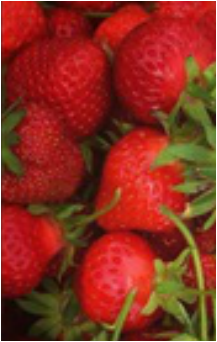 Shaunna Neil, Curve Lake First Nation Shaunna Neil, Curve Lake First Nation The really lovely thing about strawberries is that their sweetness reminds us of what is important in life. The Anishinaabeg word for strawberry is ode’min and the exact translation is heart berry. It is called that because it is red and shaped like a heart. In the Anishinaabeg tradition the heart is an important repository of knowledge. Actually, in many ways the heart is a stronger and more intuitive repository of knowledge than the mind. After all, in terms of our intrauterine development we are a heart first. As a learner and thinker I value heart knowledge as a way of knowing so much so that I went through the painstaking process of developing it as a method at the doctoral level, and then proceeded to produce my knowledge − meaning my dissertation on the Algonquin land claims process − using it as part of my methodology. When I think about the heart as the more powerful repository of knowledge that it is, I realize that it holds the capacity to challenge and transcend how we usually understand time. The heart is able to collapse time, even intergenerationally passed time, into one single moment. Sometimes when we think back to a past time we feel the same as we felt back then. In this way the heart erases the time that has passed. Put another way, within human consciousness heart knowledge changes our usual understanding of time. Through the heart, time becomes relative. This is the power of heart knowledge that we all need to respect. In the work I do regarding Indigenous issues and nation rebuilding, I encounter a lot of people who have been hurt by the processes of colonization. Some of these people are very expressive of how they have been hurt. I have come to realize that we need to listen to these people and not make it worse by saying “get over it”. As humans it is our responsibility to listen and mirror in a good way. We are only people within relationships after all. I have encountered people who have been hurt by the residential school system, people who are spiritually disenfranchised because of the politics of Indigenous identity, and women who have been hurt by the fathers of their babies. Many people are also experiencing the hurt of drug and alcohol addiction in their families, as well as issues of homelessness. Then there is the contemporary land claims and self-government process, a process designed to continue the colonial agenda that sets up Indigenous people to fight amongst ourselves. Certainly I know first-hand that it is hard to be hopeful in this context. When I listen to Indigenous people talk about their heart knowledge that they experience, and I reflect and think about what they are saying, I have come to realize something significant. In my process of observation, listening, and critically reflecting on the effects of colonization on people I have come to realize that people have their own relationship with their embodied heart knowledge. Within a group of people there are different relationships to heart knowledge. While some people rely on the discourse of “I walked through the pain and heart ache”, other people rely on the discourse of “I decided to put it all behind me”. Still further, I have also heard other people say they “walk with their heart knowledge every day”. It remains with them in all they do. In sum, people have a relationship with their heart knowledge and we need to value this relationship, rather than assume that everyone gets over it or walks through it.  Lynn Gehl, Ph.D. is an Algonquin Anishinaabe-kwe from the Ottawa River Valley. She has a section 15 Charter challenge regarding the continued sex discrimination in The Indian Act, and is an outspoken critic of the Ontario Algonquin land claims and self-government process. She has three books: Anishinaabeg Stories: Featuring Petroglyphs, Petrographs, and Wampum Belts, The Truth that Wampum Tells: My Debwewin of the Algonquin Land Claims Process, and Mkadengwe: Sharing Canada's Colonial Process through Black Face Methodology. You can reach her at [email protected] and see more of her work at www.lynngehl.com. Please like, share, and comment on this Black Face Blog.
5 Comments
Heather Majaury
11/30/2013 11:41:43 pm
The fact that the heart actually is a mind is scientifically supported by Dr. Gabor Matte as well. I will have to find the quote but I found it validating to know that science is describing what Anisinaabe Epistomology is already clearly articulating. Thanks for this knowledge.
Reply
12/1/2013 11:06:05 am
So true! I love what you wrote, Lynn, about heart knowledge making time relative. And listening to our heart knowledge helps us stay connected to the Land, despite all the tech temptations of modern life. Along those lines, "Hearts in the Snow" is one of my songs that taps heart knowledge, about an Action I was honoured to be part of to try to protect the South March Highlands.
Reply
Fabio Fina
12/3/2013 05:52:07 am
I really enjoy reading both your blog posts and your FB sharings.
Reply
Stefanie Levi
12/6/2013 10:02:23 am
Migwech! I have been thinking a lot about cultural transmission, lately, as everyday we are confronted more and more by the globalization of colonialism. also thinking about resilience and "survivance" as Vizenor has named another aspect of indigenous resistence/endurance. What you've shared here is so helpful.
Reply
davina Klatsky
1/10/2014 05:10:28 am
Lynn, Just beautiful what you wrote.
Reply
Your comment will be posted after it is approved.
Leave a Reply. |
|
To subscribe to Lynn's Blog: click here
To subscribe to Lynn's Newsletter: click here To follow Lynn on her Public Facebook Page: click here To subscribe to Lynn's YouTube channel: click here To book Lynn as a speaker: click here To contact Lynn/License her work: click here Copyright Dr. Lynn Gehl, 2024 All Rights Reserved
|
 RSS Feed
RSS Feed
